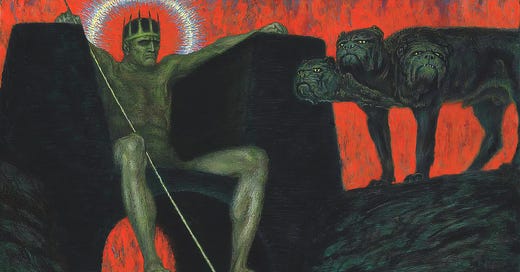In my last newsletter, referencing the plutocracy, I wondered to myself, what does Pluto, one manifestation of the Greek god of the underworld, have to do with a society governed by its wealthiest members, so I did a little research. Why not give Pluto a little love these days? After all, his planet’s retrograde this year and next is setting him dancing between one zodiac sign and the next, before late next year when he finally gets to settle into Aquarius for the next 19 years. A dance like that deserves some attention.
What I found out from my research is, nothing. Or potentially, a little bit.
Turns out, Ploutōn is a completely different god from Ploûtos. The former, rendered in English as Pluto, is an iteration of Hades, the god of death and the underworld, and the husband of Persephone, a goddess associated with spring and growth. Ploûtos, on the other hand, is a god you would pray to for matters of wealth.
While we’re giving these gods some attention, it’s useful to point out that they are not the simple baseball card version of themselves that has been curated in the last century or two, where this god’s a catcher and that god’s a pitcher or a first baseman. Given that ancient Greek society carried many influences from an earlier revolution that toppled multiple states across the eastern Mediterranean, their gods were not elements on a pyramid of perfection pointing towards the one ultimate and Most Holy God, usually a sun god who represented the perfection and omnipotence of the State. The Hellenic gods were people, full of imperfections, and these gods existed in cults, in temples, and in stories. The stories associated each god with certain virtues, proficiencies, and tribulations, and the cults running the temples would help you figure out what kind of offering you wanted to make, but there was not a one-to-one association between a god and a natural principle or sector of the economy.
Aside from the obvious, that Ploutōn and Ploûtos are going to look similar or be rendered in a similar way by English-speakers, the faithful keepers of the temple of Wikipedia offer another association: Plouton-of-the-underworld is associated with things underneath the ground, like gold, silver, and other mineral wealth, or with a destination in a quest, the god to whom the bravest adventurers might venture to ask a wish be granted. All of which bring us to Plovtos and his association with money and riches.
But on looking further into the etymology of πλούτος, I found an even more interesting connection: the root for the “pluto” in “plutocracy” and the wealth-associated god is pléō which means “sail” or “float”. Some dictionaries suggest “flow” as an even earlier root. And though mining for silver, tin, and other precious metals hidden underground was certainly a major chthonic element of the extractive network the slavers, war leaders, and merchants of the Greek city-states projected across the Mediterranean, the wealth they stole and produced moved across a space of flows, transported more often than not by sail, in the boats that earlier Mediterranean peoples had used to resist and evade the power of states, and which the Athenians, Corinthians, and others had repurposed to be the simultaneously mercantile and military vehicles for a new model of state power.
For more on these strategies and pathways of state formation, check out the book I wrote on the subject, Worshiping Power: An Anarchist View of Early State Formation. I think the evidence is pretty conclusive that lower classes and states have never existed one without the other: all states require and produce social hierarchies, and social hierarchies cannot continue without a state structure to organize and maintain them. There is an important distinction to make between hierarchies and social ranking. The latter certainly can exist in non-state societies, though the strategic bodies that form states (from colonizers to a priest or military class) use existing social ranking as a ladder to build from.
The idea of a space of flows, by the way, is used effectively in juxtaposition to the space of places, by Giovanni Arrighi to describe the relationship between State and capitalism, and different strategic logics of state power (though I am just finding out that the concept is originally associated with the Catalan cybernetic theorist Manuel Castells).
Keep reading with a 7-day free trial
Subscribe to Surviving Leviathan with Peter Gelderloos to keep reading this post and get 7 days of free access to the full post archives.




